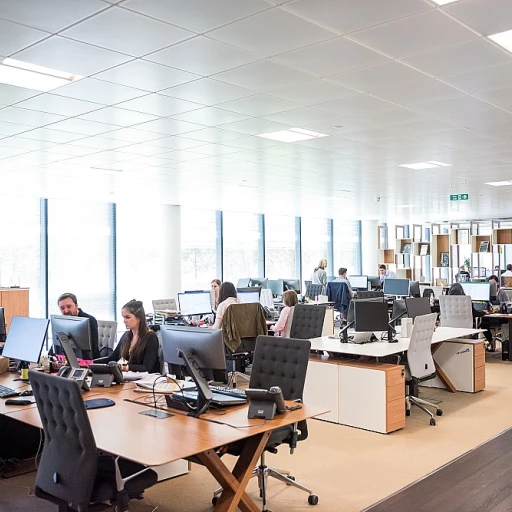
Understanding the Role of Office Management Software
Exploring the Role of Software in the Modern Office
The role of office management software has evolved significantly in modern businesses, especially within UK companies. At its core, this software aims to streamline various tasks, ensuring a more efficient and productive workplace. By integrating management tools, these systems offer a centralised platform for office managers to handle day-to-day activities effectively. Office management software serves as a hub for diverse functionalities. It enables seamless communication among team members, allowing them to coordinate efficiently. Tools like Microsoft Teams and Google Workspace enhance collaboration, supporting hybrid work models where flexibility is key. Furthermore, booking tools for meeting rooms and office space management make it easier to handle dynamic work environments. In addition, these systems provide robust data management capabilities. Office managers can track real-time data, ensuring that project management tasks are completed on schedule. The ability to handle time-critical projects with precision is a significant advantage provided by such software tools. The software also supports visitor management, helping office spaces become more secure and organised. This not only contributes to a smooth workflow but also improves the overall business environment. Understanding these features provides a foundation for UK companies to address unique challenges in their offices. Moreover, evaluating the return on investment and keeping an eye on future trends will further enhance a company's efficiency. For more insights on streamlining functions and boosting efficiency, explore ways to streamline support functions.Key Features to Look for in Office Management Software
Essential Attributes of Effective Office Management Software
A successful office management software can exponentially enhance office productivity and streamline operations. For companies in the UK looking to optimize their workplace systems, knowing what key features to prioritize is paramount. Here's what to consider:
- Project Management Tools: Essential for project planning, tracking progress, and managing team resources efficiently. Equipping your team with the right project management tools can foster better collaboration, enabling smooth handling of complex tasks.
- Booking Systems: A robust meeting room booking system is essential for organizing office spaces in a hybrid work environment. It should allow real time updates and integrate seamlessly with platforms such as Microsoft Teams and Google Workspace.
- Communication Tools: Efficient communication across teams can significantly boost productivity. Look for management software tools that include chat functions, video calls, and shared calendars to keep team members connected.
- Data Management: With cloud based management systems, storing and retrieving data becomes hassle-free. Ensure the system supports secure data handling and complies with data privacy regulations specific to UK businesses.
- Visitor Management: Enhancing security and tracking office visitors is crucial. An efficient visitor management tool helps in organizing office space and ensuring compliance with safety protocols.
- Flexible Work Management: Given the rise of hybrid work, tools that support flexible arrangements are indispensable. Ensure your management software encompasses solutions that empower employees to adjust their schedules and work locations.
Incorporating these attributes can significantly benefit office managers in achieving efficiency and improving the overall workplace experience. For more insights into how office management tools can optimize space, consider exploring practices like optimizing space with compact solutions.
Addressing Unique Challenges in UK Offices
Overcoming Challenges in Dynamic UK Workplaces
In the ever-evolving landscape of office management, UK companies face unique challenges that demand tailor-made solutions. The transition to hybrid work, for instance, presents complexities in ensuring seamless communication and efficient use of office space. While office management software offers a comprehensive system to tackle many of these issues, understanding the specific challenges endemic to UK offices can significantly enhance the effectiveness of these tools. Hybrid work strategies, increasingly adopted across the country, require adaptive solutions that provide real-time communication between team members. Software tools like Microsoft Teams and Google Workspace effectively bridge the gap between remote and in-office employees, keeping the team cohesive and functioning smoothly. Ensuring that these solutions are integrated into your project management tools can transform an office manager’s ability to guide their team effectively. Secondly, managing office resources and booking systems for meeting rooms or hot desks becomes critical in a flexible work environment. A robust office management software should include features for booking meeting rooms and managing visitor access, ensuring that workplace operations continue without disruption. Features that accommodate these needs help reduce wasted time and increase overall productivity, thus significantly contributing to the business's success. Data management is another significant concern. With offices collecting vast amounts of data through various management systems, it is crucial to employ cloud-based solutions that allow easy access and tracking of this information. This ensures that the office management system is not only efficient but also secure and reliable, paving the way for efficient project management and decision-making processes. Lastly, UK companies must navigate the legal and compliance landscape specific to the region. Ensuring that your office management software meets these regulatory requirements is essential. The tools must provide customisable features that adapt to these unique standards, providing office managers with peace of mind around legal compliance. In conclusion, addressing the prevalent challenges in UK offices requires a strategic and well-informed approach to selecting office management software. Businesses can greatly enhance teamwork through effective communication and streamlined processes, facilitating smooth operations across diverse teams and environments. To further explore how these principles can be applied effectively, consider enhancing teamwork through effective contract collaboration.Case Studies: Successful Implementation in UK Companies
Real-World Examples of Office Management Success
Implementing office management software has led to numerous success stories in UK companies, showcasing how these tools can transform workplace dynamics. Let's delve into some notable cases.
Streamlined Communication and Project Coordination
One example is a mid-sized company that integrated a comprehensive suite of management tools, including cloud-based software for project management and real-time communication. By utilizing platforms like Microsoft Teams, they significantly enhanced team collaboration. This seamless communication system helped reduce project completion times and improved overall team efficiency.
Data-Driven Decision Making
Another successful implementation can be seen in a large organization that adopted a robust office management system. The software's data analysis features allowed office managers to gain valuable insights into resource allocation. As a result, they optimized the use of office space and improved their visitor management processes.
Optimizing Hybrid Work Environments
In response to the rise of hybrid work, a technology firm introduced a software solution that allowed for flexible workspace booking and efficient management of remote teams. The system's integration with tools like Google Workspace facilitated smooth transitions between office and remote work, keeping team members connected regardless of location.
These case studies illustrate the transformative impact of management software in addressing unique challenges faced by UK offices. By selecting the right features tailored to their needs, companies can create a productive and efficient workplace environment.
Evaluating the ROI of Office Management Software
Optimising Return on Investment with Office Management Systems
Evaluating the ROI of office management software in UK companies requires a thorough understanding of both financial and non-financial impacts on the business. When implemented effectively, these systems can deliver substantial benefits that justify the initial investment.- Cost-saving opportunities: By streamlining processes and reducing manual workloads, companies can cut costs related to time-consuming tasks. This allows teams to focus on core business functions, ultimately enhancing productivity and reducing operational expenses.
- Improved efficiency: Management tools such as project management and visitor management systems integrate seamlessly with existing technologies like Google Workspace and Microsoft Teams. This facilitates quicker decision-making by providing real-time data access across the workplace.
- Enhanced employee satisfaction: Flexible work arrangements, supported by tools like cloud-based management software and booking systems for hybrid work environments, ensure that team members can efficiently manage their time and tasks. This adaptability fosters positive work experiences, leading to higher employee morale and retention rates.
- Scalable solutions: As businesses grow, the scalability of office managers' tools is crucial. These systems can easily accommodate an expanding workforce and increased demands, making them a resilient asset for future scalability needs.
Future Trends in Office Management Software
Anticipating the Evolution of Office Management Software
The landscape of office management software is constantly transforming, driven by the ever-evolving needs of dynamic workplaces. Understanding future trends will help offices stay ahead, especially in a hybrid work environment.- Cloud-Based Integration: As more businesses move to cloud-based solutions, integrating management tools such as Microsoft Teams or Google Workspace will be pivotal. These platforms enhance real-time communication and collaboration among team members, making office management more seamless.
- Enhanced Data Analytics: Future tools will incorporate advanced data analytics, providing office managers with insightful data for efficient decision-making. This will help tailor the workspace to the needs and preferences of employees, enhancing productivity and satisfaction.
- AI and Automation: Automation remains prominent, with AI capabilities improving management systems. Tasks like booking meeting rooms or managing visitor data will become more automated, freeing office managers from routine tasks and allowing them to focus on strategic initiatives.
- Improved Project Management Features: Expect enhancements in project management functionalities. Tools that offer robust project management systems will become crucial, helping teams manage time and resources more effectively.
- Flexible and Hybrid Work Support: With the rise of flexible work, office management software will increasingly cater to hybrid work arrangements. This includes features that support flexible work schedules and virtual collaboration.
- Sustainability Features: More tools will incorporate features that help companies meet sustainability goals, reducing the office's carbon footprint through smarter resource management.













